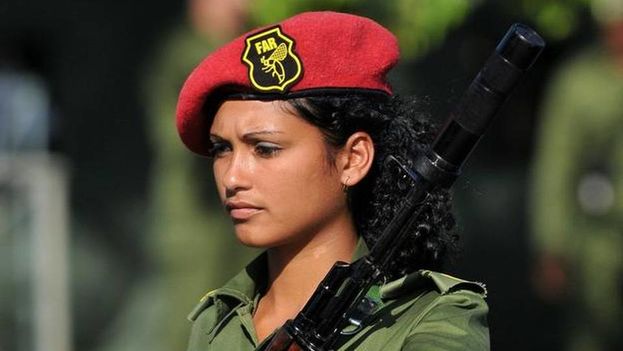
![]() 14ymedio, Mario Penton, Miami, 3 March 2017 – With the opportunity to study at the university by passing the University entrance exams with the “minimum score,” the Ministry of Higher Education (MES) is offering an incentive for young women who want to enlist in Military Service, which is an obligation for men.
14ymedio, Mario Penton, Miami, 3 March 2017 – With the opportunity to study at the university by passing the University entrance exams with the “minimum score,” the Ministry of Higher Education (MES) is offering an incentive for young women who want to enlist in Military Service, which is an obligation for men.
The announcement was made by the MES authorities during a press conference this Thursday, where they stressed that the requirements for regular entry to higher education for candidates who are not military women remain the same: “Pass exams in Math, Spanish and History with a minimum of 60 points” and compete in the provincial roster for a university seat.
“They will be offered first-rate careers and the Ministry will do everything possible to offer them the majors they request,” said a journalist at the meeting.
“An important element is that they will be given the possibility of enrolling in the regular day course,” he added.
The enrollment for the subjects that are studied in regular daytime courses will be 36,705 places for the next course.
In the case of women who choose to wear the green uniform of the Revolutionary Armed Forces, they will skip the requirement that they compete with other candidates in their provinces and may enroll in the universities simply by passing the entrance tests.
Recruits to compulsory military service in Cuba have the opportunity to study a university career through Order 18. That law privileges the recruits’ access to the university the second year after joining the FAR. In the case of women, they can start at the university the same year they enlist.
In the case of woman who choose to wear the green uniform of the Revolutionary Armed Forces, they will skip the requirement that they compete with other candidates in their provinces
After the arrival of Raúl Castro in 2006, university enrollment declined sharply, a trend that contrasted with the increase in the previous 20 years, when enrollment in the social and human sciences increased by 4,000%.
The entrance exams for higher education also underwent changes, becoming more rigorous.
Starting with Raul Castro’s reforms, enrollment in the humanities decreased by 83% while enrollment in the national sciences great by 13%.
In 2014, university enrollment decreased by 30%. In the 2014-2015 academic year there were 18,112 fewer university graduates than in the previous academic period.
According to statistics provided by the Cuban Government, 356,600 women worked in the country’s defense, public administration and social security in 2015, fewer than the 451,400 women that made up these organizations in 2014.
The Army continues to be one of the main institutions in the life of the Cuban nation. Its presence extends to the Government and controls the Business Administration Group that manages the main tourist companies of the country.
In 2016, Global Firepower placed Cuba in 79th position among the world’s major powers and one of the 10 most powerful military forces in Latin America.
